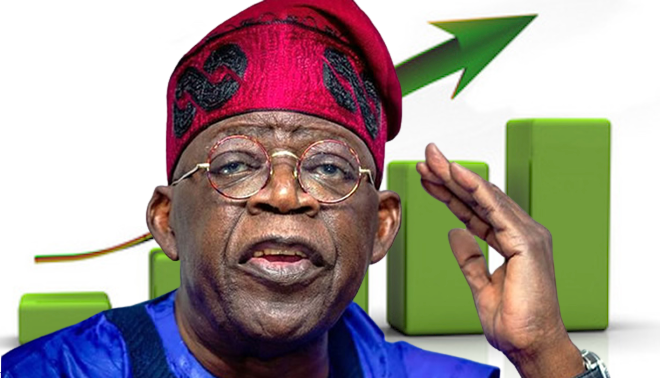MARKETS AND ECONOMY
Nigeria’s Fiscal Deficit Projected to Narrow to 3% of GDP by 2027
Business Metrics notes that this projection is a continuation of narrowing fiscal deficit recorded in 2024. Nigeria’s fiscal operations resulted in a fiscal deficit of N3.1 trillion in Q4 2024, reflecting an improvement from the N3.2 trillion and N3.3 trillion deficits recorded in Q3 2024 and Q4 2023, respectively.
Share this:
- Click to share on X (Opens in new window) X
- Click to share on Facebook (Opens in new window) Facebook
- Click to share on WhatsApp (Opens in new window) WhatsApp
- Click to share on Pocket (Opens in new window) Pocket
- Click to share on Telegram (Opens in new window) Telegram
- Click to email a link to a friend (Opens in new window) Email
- Click to share on LinkedIn (Opens in new window) LinkedIn
Published
10 months agoon

Nigeria’s consolidated fiscal deficit is projected to shrink steadily over the medium term, reaching an estimated 3.0 percent of GDP by 2027, according to the World Bank’s May Nigerian Development Update (NDU), Building Momentum for Inclusive Growth.
While rising revenues and subsidy reforms bolster the outlook, analysts warn that ambitious budget assumptions and borrowing limits pose upside risks if targets are not met.
Read Also:
The NDU highlights that revenue gains from the 2023 removal of the Premium Motor Spirit (PMS) subsidy, if fully captured as treasury receipts, could generate significant fiscal space.
Business Metrics notes that this projection is a continuation of narrowing fiscal deficit recorded in 2024. Nigeria’s fiscal operations resulted in a fiscal deficit of N3.1 trillion in Q4 2024, reflecting an improvement from the N3.2 trillion and N3.3 trillion deficits recorded in Q3 2024 and Q4 2023, respectively.
“The fiscal gains from the PMS subsidy removal, if fully transferred back as revenues, would further generate fiscal space,” the report notes, underscoring the importance of channeling these proceeds toward pro‑growth sectors.
However, the 2025 Federal Government of Nigeria (FGN) budget rests on optimistic macroeconomic and revenue forecasts, such that should actual revenues fall short despite disciplined spending, the deficit could widen sharply.
President Bola Tinubu signed the 2025 Appropriation Act into law, approving a record budget of N54.99 trillion, the highest in Nigeria’s history. The budget was raised from the initial proposal of N49.7 trillion submitted to the National Assembly.
The fiscal plan makes provisions for N13.64 trillion in recurrent expenditure, N23.96 trillion for capital projects, N14.32 trillion for debt servicing, and N3.65 trillion for statutory transfers, while projecting a deficit of N13.08 trillion, to be financed through domestic and external borrowing.
The budget assumptions include a crude oil benchmark of $75 per barrel, oil production at 2.06 million barrels per day, an average exchange rate of N1,400/$, and an inflation target of 15 per cent.
However, the NDU cautions that “Borrowing limits may be insufficient, which poses a risk of reverting back to deficit monetisation,” referring to the Central Bank’s potentially unplanned Ways and Means advances.
To sustain macroeconomic stability and keep public debt on a manageable path, the World Bank calls for intensified tax policy and administration reforms at both federal and state levels.
It noted that with states now receiving more revenue than the federal government, subnational fiscal prudence is equally critical.
“Continued fiscal prudence, anchored by reforms and actions to further raise revenues both at the Federal and state level…would be critical to maintain macroeconomic stability and keep debt on a sustainable path,” the report advises.
Nigeria’s debt profile also benefits from past moves to securitize ₦22.7 trillion of Ways and Means advances into long‑term, lower‑interest instruments.
As a result, consolidated public debt is expected to hover around 52.4 percent of GDP by 2027, with the debt‑service‑to‑revenue ratio trending below 40 percent. Yet, the World Bank warns that debt sustainability remains vulnerable to shocks such as further naira depreciation or sharp oil‑price drops.
Against a backdrop of projected current‑account surpluses—driven by non‑oil export growth and subsidy removals—the report stresses that fiscal discipline must be complemented by structural reforms.
Reliable electricity, efficient transport networks, and trade‑liberalizing measures are needed to reduce price pressures and bolster government coffers. As Nigeria heads into election season, maintaining reform momentum and avoiding deficit monetization will be central to ensuring inclusive, resilient growth.
Share this:
- Click to share on X (Opens in new window) X
- Click to share on Facebook (Opens in new window) Facebook
- Click to share on WhatsApp (Opens in new window) WhatsApp
- Click to share on Pocket (Opens in new window) Pocket
- Click to share on Telegram (Opens in new window) Telegram
- Click to email a link to a friend (Opens in new window) Email
- Click to share on LinkedIn (Opens in new window) LinkedIn
You may like


World Bank Approves $500m To Expand Finance For MSMEs In Nigeria


Stability Without Relief? 10 Things the World Bank Says About Nigeria’s Reforms


139m Nigerians Still in Poverty Despite Tinubu’s Reform Gains – World Bank


World Bank Approves $300m to Support IDPs in Nigeria


World Bank Maintains Nigeria’s Growth Forecast at 3.6% Despite Global Economic Downgrades


World Bank to Withhold $10.4m Loan to Nigeria over Audit Deficiencies








